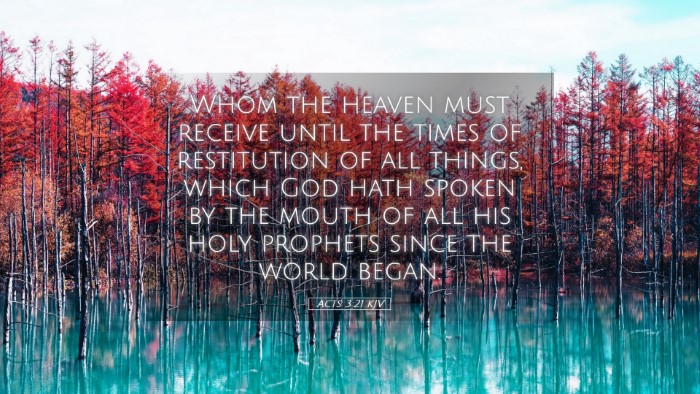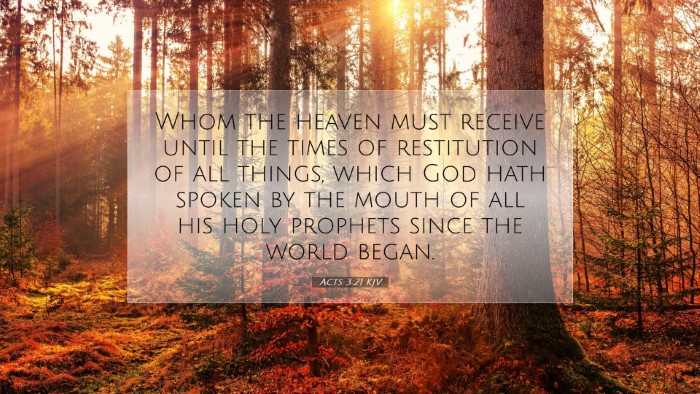Old Testament
Genesis Exodus Leviticus Numbers Deuteronomy Joshua Judges Ruth 1 Samuel 2 Samuel 1 Kings 2 Kings 1 Chronicles 2 Chronicles Ezra Nehemiah Esther Job Psalms Proverbs Ecclesiastes Song of Solomon Isaiah Jeremiah Lamentations Ezekiel Daniel Hosea Joel Amos Obadiah Jonah Micah Nahum Habakkuk Zephaniah Haggai Zechariah MalachiActs 3:21
Acts 3:21 KJV
Whom the heaven must receive until the times of restitution of all things, which God hath spoken by the mouth of all his holy prophets since the world began.
Acts 3:21 Bible Commentary
Commentary on Acts 3:21
“Whom the heaven must receive until the times of restitution of all things, which God hath spoken by the mouth of all his holy prophets since the world began.”
Acts 3:21 presents a profound declaration regarding the work and future return of Christ. The Apostle Peter, in speaking to the gathering after the healing of the lame man, articulates a key theological point about Jesus' current heavenly ministry and the eschatological promise of restoration.
Theological Insights
- The Necessity of Christ's Ascension: Peter notes that Christ must be received into heaven. This speaks to the necessity of His ascension, fulfilling the prophetic words of Scripture. Matthew Henry emphasizes that the ascension of Christ is crucial for the completion of His work within the divine economy of salvation.
- Divine Timing: The phrase "until the times of restitution of all things" indicates there is a divinely appointed timeline for events in redemptive history. Such timing is important for understanding God's sovereign plan, as per Albert Barnes, which points towards a future restoration of creation and the establishment of God's kingdom.
- Prophetic Fulfillment: The term “spoken by the mouth of all his holy prophets” highlights that this restoration has been a central theme throughout Scripture. Adam Clarke draws attention to the consistency and unity of the prophetic message across time, indicating God's faithfulness to His covenant promises since the world's inception.
Exegetical Considerations
- “Heaven must receive”: The use of the term 'receive' indicates a deliberate action by God the Father, signifying the divine approval of Jesus' ascension. This reflects the exalted status of Christ in heavenly realms.
- “Until the times of restitution”: The word “restitution” suggests a comprehensive restoration, not just of Israel but of all creation. This concept ties to eschatological hopes found in various prophetic texts, reaffirming that God's ultimate goal includes the restoration of harmony in the cosmos.
Christ’s Heavenly Ministry
According to the broader context of Scripture, Christ's ascension to heaven serves several divine purposes. First, He intercedes for the believers (Romans 8:34). Second, He sends the Holy Spirit to empower the Church (John 16:7). Third, He will one day return to complete His work of redemption. This is where the “restitution of all things” becomes pivotal, as it points forward to the culmination of God's redemptive history.
Practical Applications for Ministry
- Hope in Restoration: Pastors and theologians should emphasize the hope found in the promise of restitution. This serves as comfort to believers amidst trials and tribulations, reinforcing that God is actively working towards a restored creation.
- Encouragement in Proclamation: Each minister’s task is to proclaim the transformative message of the gospel that not only provides spiritual healing but also anticipates full restoration.
- Call to Vigilance: The knowledge of Christ's return and the "times of restitution" should serve as a call for vigilance in the life of a believer and the Church at large, recognizing that each moment counts toward fulfilling the Great Commission.
Conclusion
Acts 3:21 encapsulates essential truths about the ascended Christ and His mission until His glorious return. For pastors, students, and scholars, this verse serves as an anchoring point for teachings on Christology, eschatology, and the continual relevance of prophetic fulfillment. May it inspire a deeper study and rich understanding of the progression of God’s redemptive plan throughout human history.


